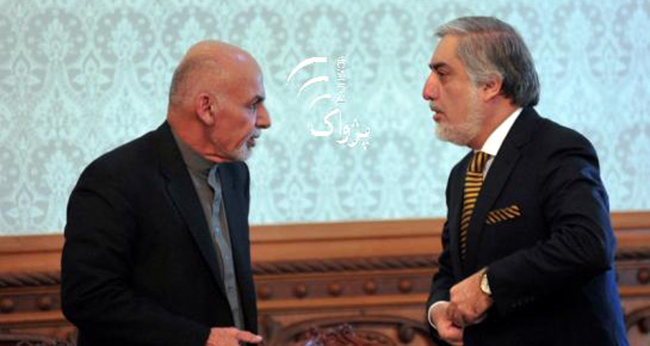Last year, in the same days, a survey conducted among a nationally representative sample of 2,500 adults across all of the country's 34 provinces. It found that nearly 81% of people are dissatisfied with leadership of President Ashraf Ghani while it was run across Afghanistan's ethnic and geographic spectrums. Considering the daily public media broadcast, social media networks and mass expressions, the citizens’ dissatisfaction is extremely increased and deepened with performance of President Ashraf Ghani and national unity government. When President Ghani and Dr. Abdullah took power, there was ray of hope for the better future that would bring positive change but things have not changed and adversely deteriorated. Yet the national unity government has been essentially locked in the unending internal conflicts, disagreements, and has not made much any improvements in people's daily lives.
Recently, the first Vice President Abdul Rashid Dostum accused President Ashraf Ghani of discrimination; he said people from the president's ethnic group are important to him, but those from his province are even more important. If you speak Pashto with President Ashraf Ghani, you will be a good person, and if you speak Pashto and you are from Logar province, then you are very good. After attending a military operation in Jawzjan, Dostum criticized the National Unity Government leaders and accused the Chief Executive Abdullah Abdullah incapable. "Mr. Abdullah Abdullah is incapable and does not have a good name among the people”, he said.
In the meantime, Ghani's special envoy for reform and good governance, Ahmad Zia Massoud, at a gathering in Panjsher province accused government of discrimination and politicizing the state organizations."What benefit will come out of me using my position in government to appoint all Tajiks into various positions? This in itself will create a bad reaction. And what benefit will come out of a Pashtoon brother who is the head of state and brings in all Pashtoons into all important positions? Nothing good will come out of this, and other ethnicities will react badly," he said. He also said that he is concerned about a possible increase in activity by Taliban and Daesh militants in the upcoming spring season. He called on jihadi leaders to be prepared to defend the country alongside the Afghan security forces.
These comes after a series of criticism against president Ghani by Abdullah Abdullah, the chief executive, for failing to work collaboratively and deemed him undeserving to serve the government. Before this, he also complained that he had been left out of key decisions, and depicted Ghani as arrogant and out of touch with the deteriorating situation in the country. The government was paralyzed and ministers did have the chance to speak as Ghani provides a one-hour lecture but had not listened to the ministers for 15 minutes. "If someone does not have tolerance, he does not deserve the presidency." He said.
Likewise, the head of Afghanistan’s main intelligence agency resigned over disagreements with the president, Ashraf Ghani, laying bare divisions that had hindered efforts to fight the growing Taliban insurgency. The resignation of Rahmatullah Nabil had followed a series of setbacks including the fall of the northern city of Kunduz to the Taliban and an insurgent raid on Kandahar airport in the south in which 50 civilians, police and security personnel had been killed. Nabil, who strongly opposed Ghani’s moves towards terrorist backers, said the president had imposed unacceptable conditions and pressures on the way he did his job.
Such Ethnic schism is one of the major fallouts of war-torn history of Afghanistan. In the first years following the ouster of the Taliban regime, Afghanistan once again became a home for all Afghans, and nation-building process began; however, some politicians’ hunger for power allowed the enemies of Afghanistan to create problems for the nation-building and unity process. After the highly disputed 2014 presidential election, ethnic politicians once again saw an opportunity to secure privileges under the cover of ethnicity and language. Although the new dispensation formed against the general will of Afghans was titled as the government of national unity, the upshots are in conflict with its name. From the very beginning, government leaders have accused each other of failures and ethnic politics. Given the involvement of foreign elements in fuelling ethnic tensions in the country in the past, such conflicts bolster the concern that some foreign circles are again seeking to sow the seeds of divisions among the fraternal Afghan ethnic groups through some politicians as their pawns to accomplish their goals. These political leaders should learn a lesson from the failures of ethnic politics in the past, and pursue politics based on national interests other than ethnic ones.
The art of leadership is built on the ability to resolve near-term challenges while remaining focused on long-term goals and objectives. The actions related to improving governance, national unity and cooperation, justice and meritocracy as well the distance of government from people define the ways to political and economic goal can be achieved in the medium- and long- terms. He might have very good vision how to rebuild this country but does not have a clear strategy or will to implement with his current leadership. The history may repeat if President Ghani fails to revise and address the many near-term obstacles and internal challenges in his path. He takes much of the responsibilities by himself while he is not an executive authority. He must unite not divide and he should lead the nation to effectively move forward not backward.
Home » Opinion » The Weakest Example of Leadership
The Weakest Example of Leadership
| Mohammad Zahir Akbari

